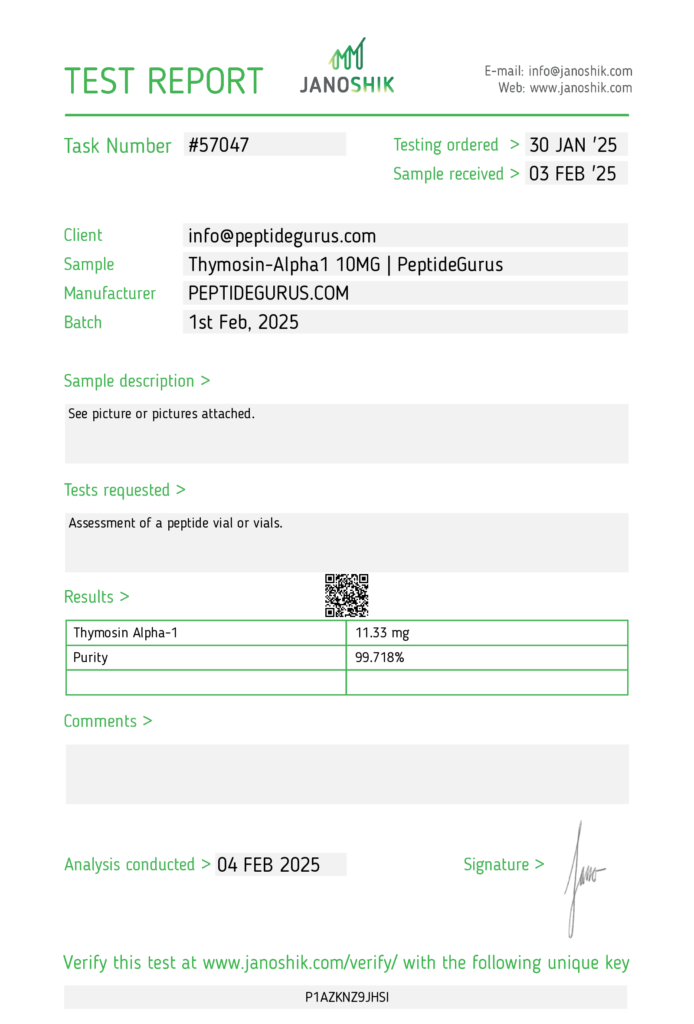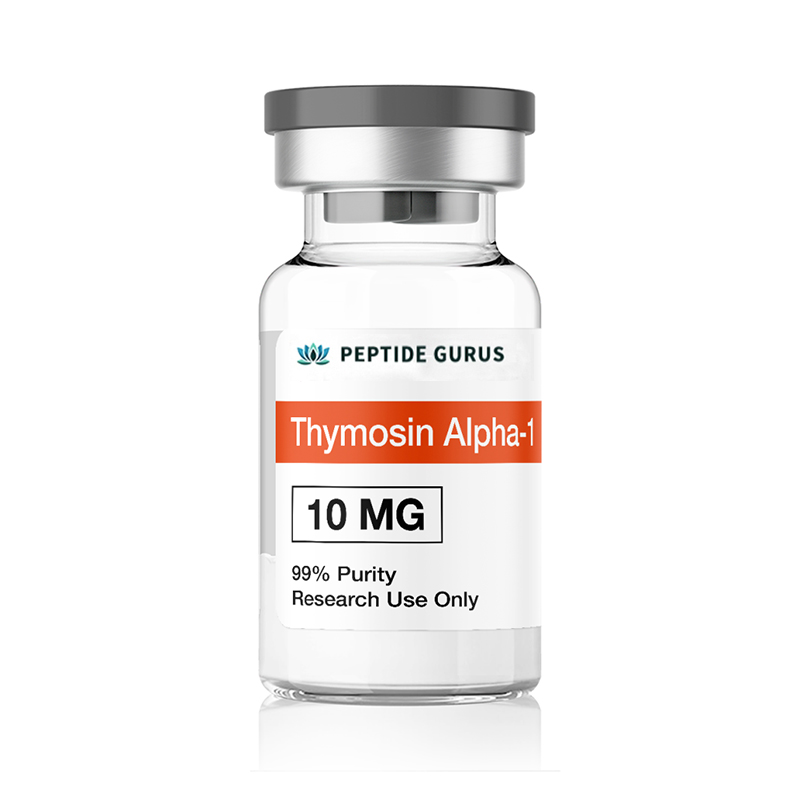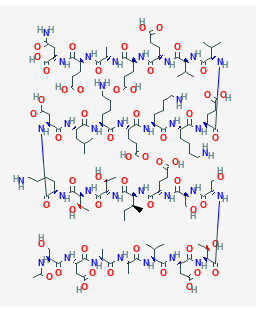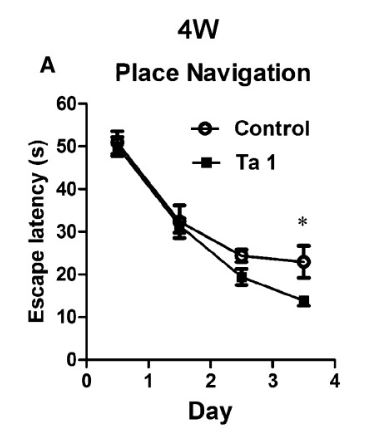




Categories: Peptide Finished product, Peptides and Their Dosages
Free (1) 30 ml Bacteriostatic Water
with qualified orders over $500 USD.
(excludes capsule products, cosmetic peptides, promo codes and shipping)
Thymosin Alpha-1 is a natural regulator of immune function. It has since been studied for cystic fibrosis, infection (e.g. tuberculosis, cytomegalovirus), respiratory disorders, chronic hepatitis, and cancer. Thymosin alpha-1 was first discovered in 1972 and was isolated from tissue of the thymus gland and is a potent immune function modulator.
Product Usage: This PRODUCT IS INTENDED AS A RESEARCH CHEMICAL ONLY. This designation allows the use of research chemicals strictly for in vitro testing and laboratory experimentation only. All product information available on this website is for educational purposes only. Bodily introduction of any kind into humans or animals is strictly forbidden by law. This product should only be handled by licensed, qualified professionals. This product is not a drug, food, or cosmetic and may not be misbranded, misused or mislabled as a drug, food or cosmetic.
Thymosin alpha-1 is a naturally occurring peptide fragment that was discovered in 1972. It has since been studied in clinical trials for cystic fibrosis, infection (e.g. tuberculosis, cytomegalovirus), respiratory disorders, chronic hepatitis, and cancer. It is currently approved for use in fighting chronic hepatitis B and C infections in 35 under-developed nations.

Sequence: Ser-Asp-Ala-Ala-Val-Asp-Thr-Ser-Ser-Glu-Ile-Thr-Thr-Lys-Asp-Leu-Lys-Glu-Lys-Lys-Glu-Val-Val-Glu-Glu-Ala-Glu-Asn
Molecular Formula: C129H215N33O55
Molecular Weight: 3108.315 g/mol
PubChem CID: 16130571
CAS Number: 62304-98-7
Synonyms: Thymalfasin
Thymosin alpha-1, first isolated from tissue of the thymus gland, is a potent regulator of immune function. The thymus is responsible for making T-cells and for ensuring that they mature properly. T-cells are some of the most important parts of the adaptive immune system, where they help the immune system remember past infections and improve the function of other immune system cells to boost their ability to fight infection.
Research in mice without thymus glands shows that thymosin alpha-1 alone is enough to restore immune function and prevent widespread infection. The peptide works at the most fundamental levels of the immune system to activate signaling pathways and stimulate the production of cytokines and other molecules that help to coordinate the activities of various cells in the immune system[1]. In other words, thymosin alpha-1 has broad, positive effects on the immune system.
One way in which thymosin alpha-1 may be of benefit is in vaccine construction. Right now, many vaccines consist of inactivated (killed) pathogens because administering live pathogens, even when they are weakened, is risky. Unfortunately, inactivated vaccines are less effective and thus immunity is not as great. Thymosin alpha-1 may solve this problem by boosting the response of the immune system to inactivated vaccines. The net results would included not only boosted immunity, but longer duration of immunity[2]. This may be of benefit, particularly in the setting of severe disease like avian influenza, HIV, and more.
Another way in which the ability of thymosin alpha-1 to regulate the immune system may be of benefit is in the setting of sepsis. Sepsis is a life-threatening condition caused by an over-inflated immune response to infection. The ability to regulate the immune response in this setting could save lives and prevent organ damage. Research suggests that thymosin alpha-1 lowers mortality in patients with sepsis and reduced long-term complications[3]. Though ongoing research is needed, the early results suggest that thymosin alpha-1 may soon be approved as an adjuvant therapy for sepsis.
The immune system plays very important roles in the growth, development, and maintenance of the central nervous system, particularly the brains of developing mammals. Research in mice indicates thymosin alpha-1 is a prominent potentiator of neurodevelopment and that peripheral administration of the peptide can actually boost cognitive function. It appears that thymosin alpha-1 affects a number of genes responsible for neuron growth and the development connections between neurons. The peptide alters the environment within the nervous system to favor growth and develop while simultaneously blocking pathways responsible for inflammation and neuron dysfunction[4]. In short, thymosin alpha-1 actually improves brain structure and function. There is interest in using the molecule to address neurodevelopmental delays, such as those associated with cerebral palsy.

Dendritic cells, a specific type of cell in the immune system, are important in helping the immune system to recognize fungal infections. Thymosin alpha-1 has been shown to induce maturation of dendritic cells, thereby boosting the ability of the immune system to fight fungal infections[5]. The peptide has also been found to activate T-helper cells in mouse models of aspergillus infection, a type of server fungus. Scientists hope to use thymosin alpha-1 as an adjuvant therapy to boost the effectiveness of standard anti-fungal treatments.
The role of thymosin alpha-1 in regulating dendritic cells cannot be overstated. Dendritic cells are responsible for taking antigens, bits of invading bugs like bacteria and fungi, and presenting them to other immune system cells in a way that makes it easy for those cells to recognize the antigens and respond appropriately. Dendritic cells are found in high numbers in the skin, nose, lungs, and GI system where they act as one of the first responders of the immune system. By regulating dendritic cells, thymosin alpha-1 affects immune system functioning at one of its most fundamental levels[6].
Thymosin alpha-1 is an effective and highly affordable treatment against chronic hepatitis B and C infections. It is also an effective immune stimulant and can be co-administered with vaccines for both viruses to improve efficacy. Thymosin alpha-1 is currently approved for treatment of hepatitis B and C in over 35 different countries[7].
Even though antiretroviral therapy has come a long way since HIV was first discovered in the 1980s, complete restoration of immune function is still not possible. Oddly enough, antiretroviral therapy itself has been linked to certain deficits in the immune response (particularly cytotoxic T-cells) as well as to persistent inflammatory conditions. Research shows that thymosin alpha-1 may be of benefit in this particular population, helping to restore immune regulation and improving overall quality of life for individuals taking highly active antiretroviral therapy (HAART)[8].
Interestingly, thymosin alpha-1 may also boost the ability of the body to fight HIV infection. It appears that the peptide stimulates CD8 T-cells to release a number of factors that inhibit HIV infection of other immune cells and prevent latent HIV from becoming active[9].
New research indicates that thymosin alpha-1 blocks angiotensin converting enzyme (ACE) and thus can reduce blood pressure[10]. ACE is a common target of prescription drugs, like lisinopril, in certain individuals with high blood pressure. Inhibition of ACE has been shown to not only lower blood pressure by relaxing blood vessels, but can also reduce cardiac remodeling, slow the progression of atherosclerosis (plaque buildup), and improve kidney function. Unfortunately, most ACE inhibitors come with a number of side effects. It is possible that thymosin alpha-1 may offer the benefits of ACE inhibition without the side effects caused by currently available drugs.
Research using human lung cancer cells (A549) indicates that thymosin alpha-1 has anti-proliferative effects, reducing both the growth and metastasis of cancerous cells. The peptide also appears to reduce cell migration, which can help to reduce penetration of cancer cells into surrounding tissue (i.e. invasion)[11].
Research combining thymosin alpha-1 with dacarbazine, a common chemotherapy, showed an increase in progression-free survival rates and no increase in rates of toxicity[12], [13]. This indicates that thymosin alpha-1 boosts the effects of the chemotherapy in reducing cell proliferation. Given the peptide’s natural occurrence, it isn’t unreasonable to speculate that it may one day form part of the basis of a cancer vaccine designed to prevent tumor development rather than treat cancer after it has already occurred.
Recently, scientists developed a long-acting version of thymosin alpha-1 and tested it against breast cancer cells in mice. Results showed that the modified thymosin alpha-1 molecule was even more effective in inhibiting growth of breast cancer cells. The modified peptide appeared to boost levels of CD4 and CD8 cells while simultaneously increasing interferon gamma and interleukin-2 levels. This was particularly important in patients being treated with steroids for the swelling caused by certain cancers[14], [15].
Thymosin alpha-1 has been tested and is undergoing active testing in a number of different cancers. Positive results have been seen in
Inflammatory pain is transmitted through specific pathways in the peripheral and central nervous system. Given the strong anti-inflammatory effects of thymosin alpha-1, scientists speculated that the molecule could effectively reduce pain as well. Research in mice suggests that this is indeed true and has even identified the specific pathways that thymosin alpha-1 interferes with. It turns out that thymosin alpha-1 acts directly at the sight of inflammation to reduce the production of cytokines and other molecules (e.g. TNF-alpha, IL-1beta, etc.) that trigger pain in the first place[16]. This mechanism of action is drastically different from typical anti-inflammatory pain relievers and may offer improved pain relief with fewer side effects than existing drugs.
One of the primary complications of cystic fibrosis (CF) is rampant inflammation that leads to poor mucous clearance, increased rates of infection, and other problems. All of these problems stem from a mis-folding of a specific protein called CFTR. Research indicates that thymosin alpha-1 can reduce inflammation and even improve function of the CFTR protein[17]. There is hope that the peptide may offer an effective single-molecule therapeutic approach to treating CF.
Research into the benefits of thymosin alpha-1 in the setting of avulsed (pulled out) and replanted permanent front teeth indicates that the peptide can improve healing of the gums and soft tissue surrounding the injury and promotes survival of the replanted tooth[18]. Though more research is required, the findings indicate that thymosin alpha-1 may be of huge benefit in the setting of traumatic tooth damage, making it easier for dentists to rescue teeth that have been knocked out.
The potential applications of thymosin alpha-1 are too numerous to list in any reasonable summary. What is notable, however, is that the peptide is already being used in a number of countries as a legitimate medical treatment. Researchers are currently looking at ways to improve the efficacy of the peptide and produce it faster and more affordably[19]. There is good reason to believe that thymosin alpha-1 variants will be investigated in clinical trials for a number of conditions in the coming years. From cancer to infection, the peptide has shown great promise as an immune system modulator with few side effects.
Thymosin Alpha-1 exhibits minimal side effects, low oral and excellent subcutaneous bioavailability in mice. Per kg dosage in mice does not scale to humans. Thymosin Alpha-1 for sale at
The above literature was researched, edited and organized by Dr. Logan, M.D. Dr. Logan holds a doctorate degree from Case Western Reserve University School of Medicine and a B.S. in molecular biology.
Allan L. Goldstein, MD, Allan L. Goldstein is professor and Catharine B. & William McCormick Chair of the department of Biochemistry and Molecular Biology at The George Washington University School of Medicine and Health Sciences, where he has served since 1978. Thymosins were discovered in the mid 1960’s, when Allan Goldstein from the Laboratory of Abraham White at the Albert Einstein College of Medicine in New York studied the role of the thymus in development of the vertebrate immune system. He is a world-renowned authority on the thymus gland and the workings of the immune system, and co-discoverer of the thymosins. Dr. Goldstein is the author of over 400 scientific articles in professional journals, the inventor on more than 15 U.S. Patents, and the editor of several books in the fields of biochemistry, biomedicine, immunology and neuro-science. He is on the editorial boards of numerous scientific and medical journals and has been a consultant to many re-search organizations in industry and government; co-founder of The Institute for Advanced Studies in Aging and Geriatric Medicine, a non-profit research and educational institute; a member of the Board of Trustees of the Albert Sabin Vaccine Institute; and serves as the Chairman of the Board of RegeneRx Biopharmaceuticals. Dr. Goldstein received his B.S. from Wagner College in 1959 and his M.S. and Ph.D. from Rutgers University in 1964. He served as a faculty member of the Albert Einstein College of Medicine from 1964 to 1972, and moved to the University of Texas Medical Branch in Galveston in 1972 as professor and director of the division of Biochemistry.
Allan L. Goldstein, MD is being referenced as one of the leading scientists involved in the research and development of Thymosin Alpha 1 and other Thymosins. In no way is this doctor/scientist endorsing or advocating the purchase, sale, or use of this product for any reason. There is no affiliation or relationship, implied or otherwise, between
ALL ARTICLES AND PRODUCT INFORMATION PROVIDED ON THIS WEBSITE ARE FOR INFORMATONAL AND EDUCATIONAL PURPOSES ONLY.
The products offered on this website are furnished for in-vitro studies only. In-vitro studies (Latin: in glass) are performed outside of the body. These products are not medicines or drugs and have not been approved by the FDA to prevent, treat or cure any medical condition, ailment or disease. Bodily introduction of any kind into humans or animals is strictly forbidden by law.
PeptideGurus is a leading supplier of American-made research peptides, offering top-quality products at competitive prices. With a focus on excellence and customer service, they ensure a secure and convenient ordering process with global shipping.
CONTACT